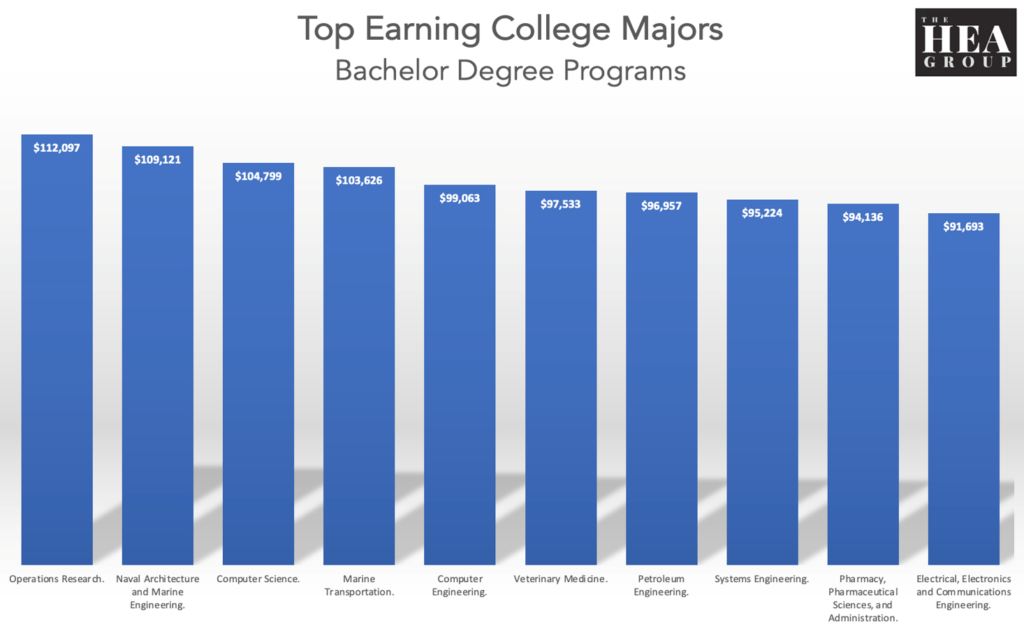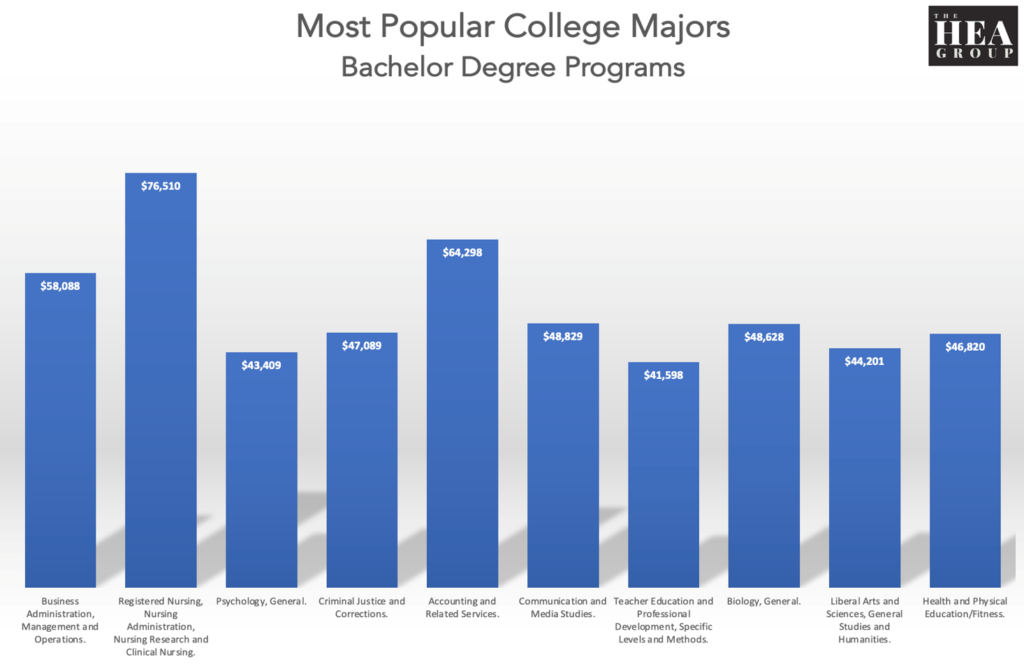At this moment when high school students are donning graduation caps and strolling across stages, a big question looms for those heading to college. What should I major in?
The typical advice given to graduates is something along the lines of “follow your passions” or “do what you love.” But for many people, this decision is much more complicated. If you are paying a great deal of money to attend college (the average cost is $35,551 per student per year), you want a good return on your investment. That’s especially true nowadays when many students take out loans to pay for tuition (and the average student loan debt is currently $37,338).
The HEA Group, which analyzes data about higher education, ran the numbers on college majors based on one factor alone: the salaries earned once the students graduated. They used data released by the U.S. Department of Education and found that, not surprisingly, the fields that provided the greatest financial return on investment were in STEM (science, technology, engineering and mathematics).
Within the STEM fields analyzed, computer science was the most popular among college students. HEA’s data revealed that students in that major saw early career median earnings of $104,799 per year, and it ranked third among the top earning majors.
The second most popular STEM major is electrical, electronics, and communications engineering. The median salary for these students was $91,693 per year, ranking 10th on HEA’s list of top-earning majors.
Operations research topped the list with grads earning $112,097, followed by naval architecture and marine engineering ($109,121).

No doubt the STEM fields are hot right now. According to the U.S. Bureau of Labor Statistics, the demand for workers in these fields will continue to rise by 10.8% by 2031. And in a 2022 career interest survey released by the National Society of High School Scholars, the STEM fields were highly valued as career motivations for Generation Z.
But when it comes to choosing a college major, not everyone is going into the most lucrative fields of study. The HEA Group also ran the numbers on the most popular college majors, and they did not overlap with the ones that lead to the highest salaries.
In fact, graduates in only three of the most popular majors went on to earn above $50,000 per year. Those were in business administration, registered nursing and accounting.

Liberal arts and sciences, general studies and humanities were among the top 10 most popular majors. In this list of the most popular degrees awarded in every state, this one appears repeatedly. The average early career earnings for this major? $44,201 per year.
Another unsurprising but discouraging detail from the HEA Group’s report: Those going into the teaching field will earn an average of $41,598 per year. Despite the low projected pay, this major ranked within the top 10 most popular degrees pursued.
The HEA Group also looked at the earnings potential for majors within associate degree programs. These degrees require less time and money to complete, so the return on investment is naturally lower. But among this group, too, the highest salaries go to students in STEM fields.
Students in three of these majors went on to earn more than $70,000 within four years of earning their degree. Those majors were physical science technologies, bioethics/medical ethics and construction engineering technologies.

Top Earning Careers With An Associate Degree
The HEA Group also studied the most popular associate degrees. The earnings potential here was all over the map. The second most popular bachelorette program was registered nursing. The salaries here averaged just under $67,000 per year.
On the lower end of the financial spectrum, health and medical administrative services and culinary arts have average salaries just above $30,000 for graduates four years out.
The HEA’s data tells a story: Those pursuing lucrative careers and a financially comfortable life ought to choose their college major based on statistical outcomes. Following your passions in some cases can prove to be more financially challenging.

But the debate over whether a career is about earning money — or pursuing your gifts and passions — will no doubt continue. Those on the other side of the debate are certainly pointing out the downsides of everyone pursuing careers in STEM .
“If we all study engineering … and allow the humanities and social sciences to fade away, something terribly important will be lost, for students and society both,” columnist Nicholas Goldberg wrote in The Los Angeles Times. “Particularly at a time of demagogic populism and close-minded partisanship, when civic discourse is being coarsened and dumbed-down … The liberal arts matter because how we think matters as much as our acquisition of job skills.”
The HEA Group seems to acknowledge this in its “final thoughts” about the outcomes of their survey.
“College isn’t just about the money,” they wrote. “There are many intangible aspects that salary data simply won’t measure. However, it is reasonable for one to expect that they will earn more over time by obtaining a college degree, and it’s worth knowing that some fields of study are more likely to lead to a higher economic premium. This new salary data allows prospective students to make a more informed decision as they examine individual programs at colleges they are considering.”
Perhaps some students can double major in a STEM field and a field they love. That way, the student can snag an engineering job, earn a nest egg, and then pursue what they really want to do.
This story originally appeared on Don't Waste Your Money. Checkout Don't Waste Your Money for product reviews and other great ideas to save and make money.


